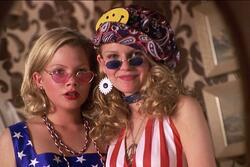Gretchen Wieners Complicates "Good" Jewish Representation
Feeling uneasy on a long flight, I sunk into my seat and selected a comforting favorite: Mean Girls (2004). As the world below me seemed to shrink, I let myself be transported to the pink and drama-filled paradise that is North Shore High. Mean Girls is a movie that I keep coming back to, no matter how many times I’ve watched it or how many of the lines I can recite. I first watched the film in middle school when I was struggling with friendships and was unsure of the person I wanted to be. Mean Girls deeply resonated with me because of its themes of self-discovery and friendship.
Mean Girls follows Cady Heron, who has recently moved from Kenya and is attending American high school for the first time. At her new school, she meets the “Plastics,” the popular clique. Encouraged by her new friends Janis and Ian, she pretends to become one of the Plastics in order to take them down from within.
The 2004 film, while arguably the best installment in the Mean Girls franchise, lacks diverse representation. In fact, it lacks much diversity at all. There are a few non-white side characters and a stereotypical gay man. And then there is Gretchen Wieners. Gretchen is part of the Plastics, and she’s second-in-command to the queen bee, Regina George. Gretchen is the only openly Jewish character in the movie, but I would be lying if I said Gretchen Wieners is a perfect example of what it means to be Jewish.
Gretchen’s character is closely modeled after the “Jewish American Princess” stereotype. She comes from money, and because of her high-profile family and social power, she believes she’s above any form of consequence. Towards the end of the movie, when defending her actions, Gretchen argues that she shouldn’t be punished for being well-liked, even though her popularity enabled her unkind treatment of others. Gretchen is also known for being the nosy Plastic. One character even jokes that her curly hair is so big because “it’s full of secrets.” Additionally, other characters consider Gretchen the ugliest of the Plastics, and it doesn’t help that she is infatuated with a guy who has no interest in a serious relationship with her. Although used for laughs, Gretchen’s character helps to regurgitate centuries-old antisemitic tropes of the “ugly, money-loving, nosy Jew.”
Clearly, Gretchen is not a perfect character. Her Judaism is surface level at best, and yet, I can’t help but relate to her. For all of her mistakes it is apparent that, above all else, Gretchen is trying. Throughout the movie, as Regina grows more annoyed with her, Gretchen finds herself bending over backward to win back Regina’s friendship, even if it means she hurts people and breaks their trust along the way. She is so desperate to be loved and accepted that she acts in ways that she later regrets. In no way does this excuse her behavior, but it’s also difficult for me to blame her when I am guilty of the same thing. We’ve all made mistakes when we felt insecure or hurt, and Gretchen Wieners is no different.
Gretchen’s imperfections are part of what makes her character so important. So often minorities, Jewish people included, are portrayed in one of two ways when they are represented in the media. The first is a completely villainized caricature of an identity that paints an entire group as an immoral monolith. However, a similarly dangerous portrayal presents the character as unequivocally good. Nobody is perfect, and by stripping characters of any flaws, viewers who share an identity with the character are barred from feeling represented.
To me, Gretchen is a beloved character because she lands somewhere in the middle. She is by no means a role model, but I still admire her and appreciate her redeeming qualities. For example, Gretchen is incredibly intelligent and observant. However, the byproduct of this is that she’s painfully aware of the feelings and attitudes of everyone around her. In other words, Gretchen over-analyzes everything. As a teenage girl, but really, as a human, this is all too relatable. Having a character like Gretchen is proof that I’m not alone in this—many other people experience the same feeling of inadequacy or self-consciousness at times.
Furthermore, Gretchen can serve as a conversation starter by encouraging communication and vulnerability between people who struggle with similar issues. I see this as one of the most important aspects of representation. When discussing difficult subjects, it can often be easier to start a dialogue by using a fictitious experience than a personal, real-life one. Because of this, fictional characters that are going through the same things you are can be a vital next step toward having meaningful, healing conversations.
I wish the writers of Mean Girls didn’t rely so heavily on stereotypes when crafting Gretchen’s character, but I don’t think that her many flaws stop her from being valuable representation. Gretchen is someone who, like many of us, is still making sense of where she fits in the world. It’s an awkward process, filled with insecurity and mistakes, and for that reason, representing her story is even more critical. Gretchen makes Mean Girls relatable and comforting to watch, and that’s part of the reason I’ve kept coming back to this film. I’m still dreaming of a world in which Gretchen pales in comparison to other representation for Jewish girls. For now, however, Gretchen Wieners is pretty “fetch.”
This piece was written as part of JWA’s Rising Voices Fellowship.






